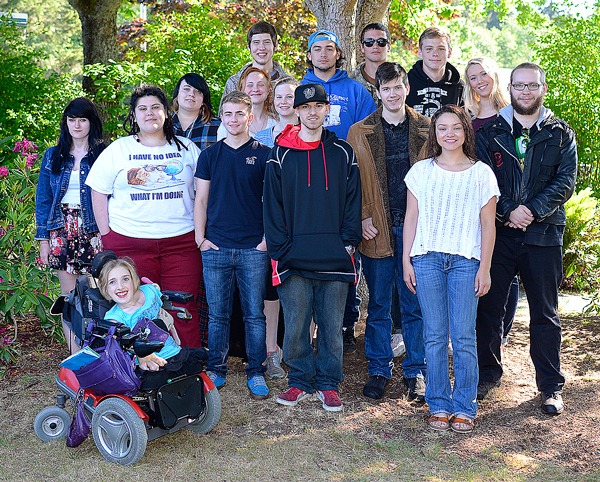They came from different starts and found a similar finish at South Whidbey Academy.
A group of 16 students will receive their diploma covers and graduate from South Whidbey’s alternative high school program Thursday. It will be the third graduating class at the school, which opened in September 2012.
The week prior to graduating, a handful of the soon-to-be graduates met with The Record to reflect on their journeys, struggles, triumphs and what’s to come.
Asked what word they’d use to describe the difference of South Whidbey Academy’s Pathways Program (grades nine-12), they said, “perseverance,” “change,” “autonomy,” and “independence.”
One of the common themes for the small sample of seniors was feeling unwelcome and out of place in other school settings. Some came from out of state, others from across the road at South Whidbey High School.
They were, or at least felt like they were, outsiders.
“I couldn’t focus in the classrooms because they were too big and I suffer from anxiety,” said Julie Casey-Peters, 18, as tears welled in her eyes.
Casey-Peters said she was bullied and didn’t feel supported in her previous school. Years ago she fell off her horse and suffered some head trauma and was nearly blind. That kept her out of class and she fell behind.
Having enrolled at South Whidbey Academy two years ago, she has since been an exemplary student.
“Now I’m a four-time honor roll student because of this school,” she said through teary eyes.
As an equestrian competitor and trainer, she needed a flexible schedule that allowed her to work in Coupeville.
Karin Fifield, 18, of Freeland, said she transferred to the academy seeking a new atmosphere. She grew up on Whidbey and wanted a “healthier” place to learn.
“I’ve been called a freak … The schools never did anything,” she said.
“It had created great stress relief that I needed and I found the greatest teacher ever in Ms. (Leah) Tormey,” she added, referring to the impact of South Whidbey Academy.
Other students needed self-directed classes to earn make-up credits for previously failed courses. Daryck Porter, who has been in the alternative program for three years, said the smaller class sizes helped him receive more individualized instruction. He was receiving special education instruction in elementary school, moved to regular classes by middle school, but started failing.
“At this school, I’ve gotten to the point where I’m graduating,” he said.
Also, finding a place where he felt accepted helped Porter, 19, who said he lived in “Frangley,” the Goss Lake-area between Langley and Freeland.
“I’m the stereotype kid,” he said, pointing to his full beard and leather jacket. “I don’t fit in the ‘normal’ crowd, I get stressed in that.”
Seth Townsend-Tyers, 18, has been in an alternative program most of his life. He was in the Cedar School program in Coupeville prior to enrolling at the Bayview School, which became South Whidbey Academy and relocated in 2012. He said he wanted to attend Bayview because of its reputation as a place for the outsiders and second-chance students.
“One of my initial attractions to the Bayview School was that connotation,” Townsend-Tyers said.
Madinah Goodson, 20, came to Clinton from the San Antonio, Texas area this year. Dyslexic and with a diagnosed anxiety disorder, she fell behind in the Lone Star State and was facing getting her high school diploma in 2018.
Moving to Whidbey, she only needed one class this year to wrap up her requirements and retook others to improve her grades in math and science.
“Moving here and having people that took the time to help me really made a difference,” she said.
Goodson will be one of the faculty-selected student speakers at the ceremony Thursday. Only a South Whidbey Academy student for one year, she immersed herself in the school’s culture, joining the Invent team and robotics club. Previously she wasn’t much for extracurricular academic activities.
“There’s always something strange happening here and I like it,” she said.
As the school continues moving toward a full alternative program rather than a last-chance school, some of the to-be grads said they hope the school retains its small-family feel. Porter cited a Christmas party the high school students organized in his first year in the alternative school.
“It’s nice when the high schoolers get together and plan something,” Porter said.
“It’s my second family almost,” added Fifield.



